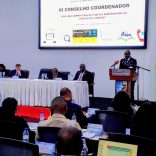Mozambique: Minister meets Venâncio Mondlane's delegation on legalising new party Anamalala
Mozambique elections: National vote count can be secret, Constitutional Council rules – CIP Eleições

CNE session on Saturday 26 October with a Power Point presentation of the results. [Photo: Sala da Paz]
The national vote tabulation can be done in secret, even though district and provincial counts are open to party agents and observers, the Constitutional Council ruled on Saturday 9 November. The CC rejected a protest by eight parties who said that their agents were only allowed to attend a CNE session on Saturday 26 October in which they were shown a Power Point presentation of the results; no formal results sheets were produced, signed or posted as required. But the actual final count had been done at a closed meeting on 25 October, which they argued they should have been allowed to attend. But the CC rejected their complaint.
At national level, the CNE is supposed to simply add together the provincial results. In its statement the CNE said that STAE had done the actual work of bringing together the district and provincial results sheets and minutes. And the meeting simply approved the detailed tables provided by STAE. The parties say the 25 September meeting was the “real” <“verdadeira”> national count, and that the CNE even approved a deliberation confirming those results on 25 September. But the CC rejected that argument.
The law actually makes a distinction. For the district and provincial counts, “party agents can be present for the work of compiling the results”. But at national level the law creates a special “national results assembly” and party agents can only attend the national results assembly, not the work of compiling the results, in contrast to lower levels. (art 101A, 110, 149, 150 of law 2/19)
The law gives observers the right to observe the “centralisation and compilation of electoral results at district, city, province and central levels”, but this has never been tested, and observers were not allowed to attend the 25 October CNE meeting. (art 262, law 2/91)
The parties made two other arguments, also rejected by the CC. The parties complained that they were not given copies or access to the documents used to compile the results. But the CC went on to argue that the parties should have collected signed copies of results sheets (editais) at district and provincial level, and done their own parallel count, which they could have used to challenge the results presented at the national results assembly.
Parties also say that the law specifically requires that they be told about the national assembly in writing, but they were only told by telephone. This is an “infraction”, the CC admits, but it did not matter as all party agents attended the 26 October meeting.
The eight parties making the complaint were Renamo, MDM, Amusi, PJDM, Podemos, Panamo, UDM, and Nova Democracia.
CC rulings are available on http://www.cconstitucional.org.mz/Eleicoes-2019; this is Acordao 17.













Leave a Reply
Be the First to Comment!
You must be logged in to post a comment.
You must be logged in to post a comment.